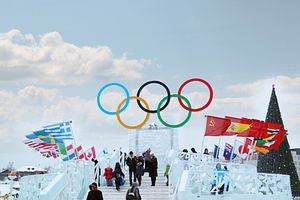Beijing on Monday was among three cities named as the finalists for the 2022 Winter Games, along with Kazakhstan’s Almaty and Norwegian capital Oslo. If chosen, the Chinese capital would become the first city to ever host both the Summer and Winter Olympics.
Even a year ago, Beijing’s chances of landing the 2022 bid appeared slim. South Korea’s Pyeongchang is scheduled to host the 2018 Winter Games, and Tokyo the 2020 Summer Games. It seemed inconceivable that the International Olympic Committee (IOC) would pick an East Asian site for a third straight Olympics.
But then public opinion got in the way – in places that it mattered.
First, Munich dropped out after a referendum to host the Games was decisively rejected by the voters. The Bavarian resort of Garmisch-Partenkirchen had hosted the 1936 Winter Games and the Bavarian capital the 1972 Summer Games. But with strong public backlash, it’s unlikely that the region will make another bid in the near future.
Stockholm and Krakow, Poland were the next to withdraw their bids, in January and May this year, respectively. Public opposition doomed both candidates, the latter via a referendum. Finally, Lviv withdrew its bid on June 30 in the midst of ongoing political unrest in Ukraine.
Of the three applicant cities that are left, Oslo on paper had been seen as the odds-on favorite. It’s in Western Europe, which has not hosted a Winter Olympics since Turin in 2006. Norway also has a great track record with the 1994 Lillehammer Games, generally considered as the best-run Winter Olympics ever. And, in the IOC’s preliminary Working Group Report, Oslo easily outscored the other two applicant cities in all but one category.
That would be public support, just like in the other Western democracies. Polls indicated that a majority of the citizens in Oslo and its surrounding areas oppose hosting the Games, particularly given the cost now associated with staging such an event.
The Sochi Olympics in February shattered all records with a $51 billion price tag, making it the most expensive sporting event ever held. Such expenses are now viewed by most as wasteful since many Olympic facilities fell into disuse immediately after the Games are over. In most democracies the public has little appetite for such massive spending projects that don’t necessarily benefit the communities that are footing the bill.
So even though Oslo has made it as one of the three finalists, its bid is very much in limbo. Norway’s government is mulling whether public funds will be released for the project and a negative decision this fall will certainly torpedo Oslo’s candidacy.
If Oslo is out of the mix, it’s nearly a guarantee that Beijing will land the bid to the Winter Games 14 years after hosting the Summer Games.
Almaty has always been considered a long shot, given that it received a failing grade in more than half of the categories as assessed by the Working Group Report. Kazakhstan has an autocratic regime with a dubious human rights record – though both things could be said of China’s government – and it’s never hosted anything remotely close to the magnitude of the Olympics.
That Beijing may land the Olympics nearly by default should alarm the IOC. While the Chinese capital city is certainly capable of putting on a show – as witnessed in 2008 – it will again do so as a massive government spending project without any say from the public. And if you thought Beijing’s air quality is an issue during the summer, try the winter when many residents burn coal to keep warm.
The Winter Olympics may simply become too expensive to host for anyone other than authoritarian governments that do not require public consent to lavish money on a vanity project. And the irony is that most sports in these Games are contested – and won – only by Western nations that no longer have a desire to host them.
While Beijing plans to use several existing venues built for the 2008 Summer Games, it would have to construct from scratch a cluster of facilities in Zhangjiakou, about 120 miles northwest of the capital city, plus infrastructure projects to connect all the event centers. Beijing spent an estimated $42 billion on the Games four years ago and will have to put up at least $20 billion for the Games eight years hence.
Would it be worth it? Chances are, no, judging by all kinds of Olympics facilities rotting away from not even a decade ago. But if Beijing is picked by the IOC on July 31, 2015, in Kuala Lumpur, expect the Chinese government to spare no expense, just like Russia in Sochi, because it needs nobody’s permission.
































